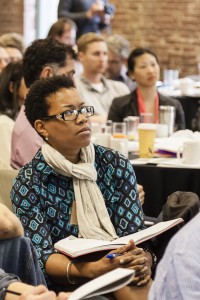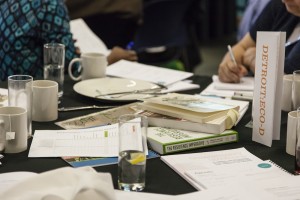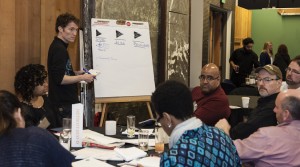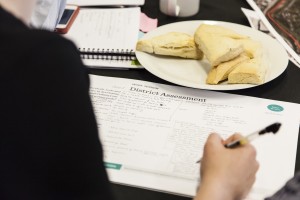Since 2012, 26 cities and 31 projects have participated in the annual EcoDistricts Incubator, an intensive 3-day training designed to help accelerate sustainable district-scale projects. This year, we are catching up with some of the former Incubator teams to explore what success looks like after the Incubator ends. We’re leading off the series with the 2014 Eco-D team from Detroit, MI. Since the 2014 Incubator, the Eco-D team has crafted the process and program by which they are going to create and define sustainable district-scale development in Detroit.
Suburban sprawl, the collapse of the automotive industry, expansive freeway development and crippling bankruptcy. The story of the decline of Detroit, formerly one of the nation’s booming urban centers, is a tragic and very public one.
Although Detroit is still the 18th largest city in the US, it used to be the 5th. It has lost over 60% of its peak population of 1.8 million in the 1950’s. At least 70,000 abandoned buildings, 31,000 empty houses, and 90,000 vacant lots spread across the urban center of the city. More than 30% of both individuals and families in the city (of which 80% are African-American) live below the poverty line.
Yet many tenacious members of Detroit’s population are fighting back against the city’s notorious image as a model of urban decay, from outspoken community activists, to community development groups, to private investors, non-profit organizations and strategic regeneration initiatives. And it’s working. Detroit’s downtown is in the midst of a very visible transformation thanks to work supported by groups like the Project for Public Spaces and private investors like Dan Gilbert of Quicken Loans. Historic areas like Belle Isle, the Detroit RiverFront and Cadillac Square have been vibrantly regenerated through robust funding and creative placemaking initiatives and programming.
 But outside of the downtown core, a tremendous amount work still needs to be done. “It’s a tale of two cities,” said Sarida Scott Montgomery, Executive Director of Community Development Advocates of Detroit. “We are creating this well invested and robust downtown, but then we have these outer neighborhoods that are languishing.”
But outside of the downtown core, a tremendous amount work still needs to be done. “It’s a tale of two cities,” said Sarida Scott Montgomery, Executive Director of Community Development Advocates of Detroit. “We are creating this well invested and robust downtown, but then we have these outer neighborhoods that are languishing.”
In response to the growing realization that Detroit’s regeneration must be holistic, equitable and sustainable, the non-profit Detroit Economic Growth Corporation worked with tens of thousands of Detroiters and leading local experts to develop the Detroit Future City Strategic Framework. Released in 2013, the DFC Framework provides a clear vision for the city’s future and promotes a sustainable city through the creation of sustainable neighborhoods.
Thanks to support of multiple foundations and partners, including the Kresge Foundation, the framework came to life over the next year. By 2014, DFC was ready to join a group of six local leaders at the EcoDistricts Incubator in May 2014 to take their ideas to reality. They came to the Incubator with a unique proposition. Rather than approach the event with one defined development project, the team aimed to develop a program and framework to support the development of multiple neighborhood-scale projects across the city of Detroit.
“If you talk to people in Detroit lately what you’ll hear is we have really been planned to death,” said Scott-Montgomery. “What is really resonating with me is that [the Incubator] provided a process for actually accomplishing projects – for getting things done.”
 Over the three days of the Incubator, the team did get things done. They worked with faculty, experts, facilitators and their peers from across the US to create an EcoDistricts Roadmap to help guide their vision well beyond the event. “We were really excited to both tap the expertise of the EcoDistricts staff and network, but also to start making connections to other people around the country working on these issues so we weren’t working in isolation,” said team member Jacob Corvidae of EcoWorks. “For us, the most valuable part was actually getting the dedicated space and time to work with our team members. Having that opportunity really galvanized and kick-started our work in a way that wouldn’t have happened otherwise.”
Over the three days of the Incubator, the team did get things done. They worked with faculty, experts, facilitators and their peers from across the US to create an EcoDistricts Roadmap to help guide their vision well beyond the event. “We were really excited to both tap the expertise of the EcoDistricts staff and network, but also to start making connections to other people around the country working on these issues so we weren’t working in isolation,” said team member Jacob Corvidae of EcoWorks. “For us, the most valuable part was actually getting the dedicated space and time to work with our team members. Having that opportunity really galvanized and kick-started our work in a way that wouldn’t have happened otherwise.”
The hard work done at the Incubator firmed the commitment of the team leaders to create Eco-D, a collaborative, technical assistance program of Detroit Future City that helps pioneer the creation of Detroit’s first ecodistrict projects. Eco-D helps every neighborhood move toward sustainability, recognizing that most neighborhoods are starting from different places.
And in less than 12 short months, Eco-D has formally launched and is making enormous strides.
 Many of Eco-D’s goals that came out of the Incubator have been solidified into the program’s objectives, including the creation of a collaborative structure that supports the creation of sustainable neighborhood-scale projects through planning, technical assistance and information-sharing; the development of workable criteria and action plans for the selection of target neighborhoods; and the coordination of existing sustainability services for greater impact in Eco-D neighborhoods.
Many of Eco-D’s goals that came out of the Incubator have been solidified into the program’s objectives, including the creation of a collaborative structure that supports the creation of sustainable neighborhood-scale projects through planning, technical assistance and information-sharing; the development of workable criteria and action plans for the selection of target neighborhoods; and the coordination of existing sustainability services for greater impact in Eco-D neighborhoods.
The team has formalized their governance structure with a Declaration of Cooperation, as well as created defined metrics and criteria to guide communities’ sustainable neighborhood development processes.
 They have also set a goal to enroll two new Detroit neighborhoods in the program each year, and they formally opened the application process just several months ago. “Two projects each year – that’s exciting! It’s something that people can really get their arms around,” said Scott-Montgomery. The next two years will function as a testing ground for the Eco-D model and the real neighborhood-scale projects they are helping get off the ground. “We are innovating, we are trying, and we are starting to make things happen on the ground,” said Corvidae. “The EcoDistricts Incubator helped us craft a real plan so that we began making progress much faster as a result.”
They have also set a goal to enroll two new Detroit neighborhoods in the program each year, and they formally opened the application process just several months ago. “Two projects each year – that’s exciting! It’s something that people can really get their arms around,” said Scott-Montgomery. The next two years will function as a testing ground for the Eco-D model and the real neighborhood-scale projects they are helping get off the ground. “We are innovating, we are trying, and we are starting to make things happen on the ground,” said Corvidae. “The EcoDistricts Incubator helped us craft a real plan so that we began making progress much faster as a result.”
